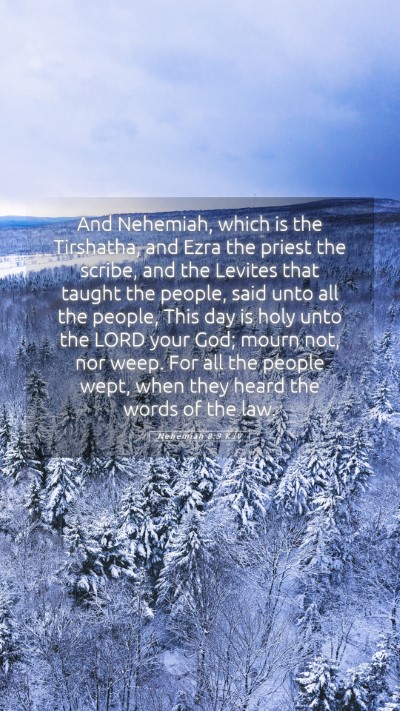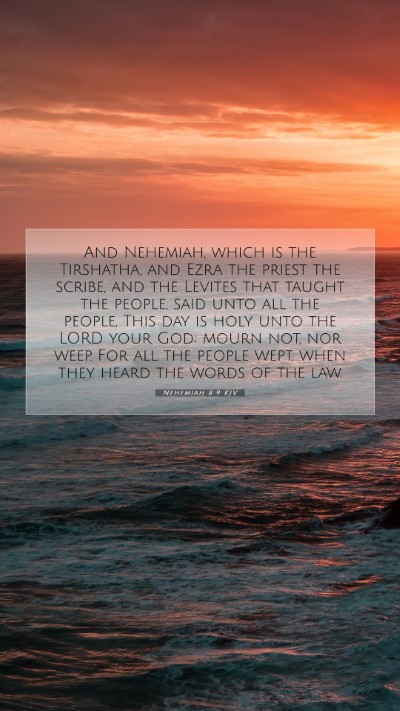Old Testament
Genesis Exodus Leviticus Numbers Deuteronomy Joshua Judges Ruth 1 Samuel 2 Samuel 1 Kings 2 Kings 1 Chronicles 2 Chronicles Ezra Nehemiah Esther Job Psalms Proverbs Ecclesiastes Song of Solomon Isaiah Jeremiah Lamentations Ezekiel Daniel Hosea Joel Amos Obadiah Jonah Micah Nahum Habakkuk Zephaniah Haggai Zechariah MalachiNehemiah 8:9 Meaning
What is the meaning of Nehemiah 8:9?
And Nehemiah, which is the Tirshatha, and Ezra the priest the scribe, and the Levites that taught the people, said unto all the people, This day is holy unto the LORD your God; mourn not, nor weep. For all the people wept, when they heard the words of the law.
Nehemiah 8:9 Bible Verse Meaning
Understanding Nehemiah 8:9
Nehemiah 8:9 states: "And Nehemiah, which is the Tirshatha, and Ezra the priest the scribe, and the Levites that taught the people said unto all the people, This day is holy unto the LORD your God; mourn not, nor weep. For all the people wept, when they heard the words of the Law."
Overview of the Verse
This verse occurs in a significant moment in the history of Israel, capturing the emotional response of the people upon hearing the reading of the Law. It reflects on themes of grief, repentance, and the holiness of God's commands.
Bible Verse Meanings and Interpretations
The verse highlights several important elements regarding the context and understanding of the Scripture:
- The Role of Leaders: Nehemiah and Ezra are portrayed as spiritual leaders who guide the people. Their authority is acknowledged, and they remind the people of the holiness of the day (Matthew Henry).
- Emotion and Repentance: The weeping of the people indicates a deep sense of remorse for their sins, illustrating how the Word of God can impact hearts. This emotional response is common when one is confronted with their shortcomings (Adam Clarke).
- Importance of the Law: The reading of the Law prompts the people to reflect on their lives. It serves as a reminder of their identity and covenant relationship with God (Albert Barnes).
- Call to Joy: Nehemiah and Ezra encourage the people not to mourn but to celebrate the holiness of the day, suggesting that while mourning has its place, there is also a time for joy in God's goodness and mercy (Matthew Henry).
Historical Context
This verse is set within the context of the Israelites returning from exile. The reading of the Law served as a critical moment for the people to reconnect with their heritage and covenant obligations.
Significance of the Verse
Nehemiah 8:9 is significant for several reasons:
- Reformation of the Faith: It marks a turning point in the spiritual life of the returning exiles as they reclaim their identity as God's people.
- Collective Experience: The weeping signifies a shared experience of conviction among the community, emphasizing the communal aspect of spiritual renewal.
- Hope and Restoration: Encouragement to rejoice after acknowledgment of sin is vital in the biblical narrative—it calls for balance between sorrow and hope (Albert Barnes).
Applications for Today
This verse provides practical applications for contemporary believers:
- Emotional Responses to God’s Word: It encourages individuals to reflect on their responses to Scripture. Are we moved to repentance, or do we celebrate joyfully? (Biblical exegesis).
- Importance of Leadership: The role of spiritual leaders in guiding understanding and interpretation of biblical teachings is paramount in any faith community (Bible study groups).
- Understanding Holiness: Recognizing days set apart as holy can enhance worship experiences and deepen faith (scripture analysis).
Related Scripture Cross References
- Ezra 3:12-13: The initial mourning during the foundation of the temple.
- Psalm 51:17: A broken spirit and a contrite heart are what God desires.
- Romans 12:2: Be transformed by the renewing of your mind, reflecting renewal through scripture.
Conclusion
Nehemiah 8:9 provides profound insights into the collective heart of God's people upon receiving His Word. It challenges readers to reflect on the significance of God's Law, the emotions tied to repentance, and the celebration of holiness in their lives.


